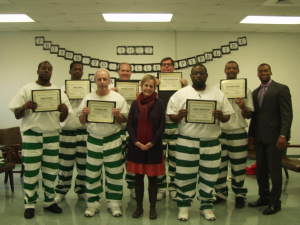The PTCPP at Parchman, Part 3
In Fall 2016, the PTCPP offered its first-ever course during the regular academic calendar. The course, entitled “Freedom: Literature and Creative Writing,” was team-taught by two University of Mississippi professors, Dr. Patrick Elliot Alexander, Associate Professor of English and African American Studies, and Dr. Ann Fisher-Wirth, Professor of English and Director of the Environmental Studies Minor.

Dr. Patrick Elliot Alexander (far right), Dr. Ann Fisher-Wirth (center), and the 7 graduates from the Fall 2017 PTCPP course at Parchman, “Education and the Environment: From Black Fiction to Creative Nonfiction.” (Photo Courtesy of Mississippi Department of Corrections)
The literary dimension of the course examined the theme of freedom in African American literature through the lens of autobiographical works published from the era of slavery to the contemporary moment. Autobiographers that course participants studied included Venture Smith, Frederick Douglass, Harriet Jacobs, Richard Wright, Maya Angelou, and John Edgar Wideman. The creative writing dimension of the course explored some of the possibilities for writing free verse—that is, poetry that is not written in meter and does not rhyme. The course featured a range of in-class and out-of-class writing activities, multiple poetry workshops, and discussions of published poetry from The Ecopoetry Anthology (co-edited by Ann Fisher-Wirth and Laura-Gray Street), Lucille Clifton’s Blessing the Boats, and Ross Gay’s Catalog of Unabashed Gratitude.
In May 2017, 11 PTCPP students’ poetry or prose works completed under the supervision of Dr. Ann Fisher-Wirth in our Fall 2016 PTCPP course at Parchman were published in a special issue of the online journal About Place. Dr. Fisher-Wirth served as the guest editor for this issue of About Place, which is a journal produced by the Black Earth Institute, an international group of poets and scholars whose work focuses on social and environmental justice and the arts. This special issue focuses specifically on the South and was the first publication for most of our PTCPP students.
In Fall 2017, the PTCPP offered its second-ever course during the regular academic calendar. The course, entitled “Education and the Environment: From Black Fiction to Creative Nonfiction,” was team-taught by two University of Mississippi professors, Dr. Patrick Elliot Alexander, Associate Professor of English and African American Studies, and Dr. Ann Fisher-Wirth, Professor of English and Director of the Environmental Studies Minor. The literary dimension of this course examined the theme of education in African American literature through the lens of novels and short fiction published from the early twentieth century to the contemporary moment. Students examined all assigned works in specific historical and political contexts (including the Harlem Renaissance, Great Migration, and Civil Rights Movement), and were particularly attentive to how and why education, mis-education, and re-education happen. Authors whose short fiction or novels students studied included W.E.B. Du Bois, James Weldon Johnson, Zora Neale Hurston, Ann Petry, Octavia Butler, and Ernest Gaines. In the creative writing dimension of this course, students read several essays and three books of creative nonfiction which were examples of environmental life writing—that is, autobiographical writing that addresses some aspect of the writer’s interactions with, or embeddedness in, environment. The essays were written by Sheryl St. Germain, Jimmy Santiago Baca, and Michael Branch. The books were Janisse Ray’s Ecology of a Cracker Childhood, Dwayne Betts’s A Question of Freedom: A Memoir of Learning, Survival, and Coming of Age in Prison, and Linda Hogan’s The Woman Who Watches Over the World. Students also wrote their own creative nonfiction pieces that were workshopped by the whole class. At the end of the semester, students turned in their revised creative pieces accompanied by a short essay that introduced and/or created a context for their individual writings.